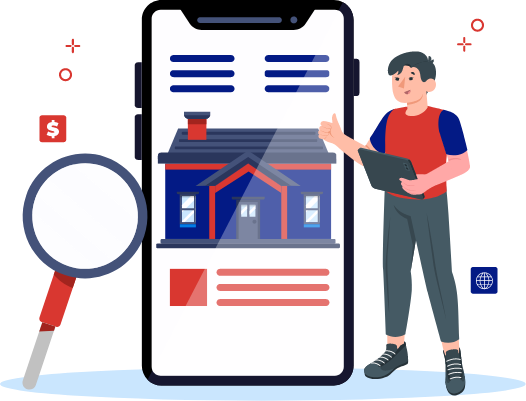As the global economy shifts toward an electronic one, the real estate industry has adjusted accordingly. By adopting technologies tailored specifically for customers’ changing requirements—mobile applications are especially common among real estate firms today—the industry has quickly adopted and utilized them.
Mobile applications have revolutionized how people purchase or rent homes. According to research done by Statista, mobile applications for real estate markets are projected to reach $12.7 billion by 2022. This shows how technology is quickly taking hold in this field, providing businesses with an enormous opportunity for success within this new marketplace.
Morgan Stanley predicts this trend will be present in global markets, including real estate. If the Indian property market was worth $100 billion in 2015, Morgan Stanley forecasts it’s worth could skyrocket to $462 billion by 2025! While this might inspire IT entrepreneurs to create online real estate start-ups, some traditional real estate agencies remain uncertain whether to go digital, expand their online presence, or transition their services onto mobile.
Are you thinking about real estate app development? Do you wonder if an app for real estate will be worthwhile and what tips should be given to create successful apps for real property? If this describes your current thinking on developing real estate apps, read further for an answer to those queries!
What Is a Real Estate Mobile App?
The mobile application developed specifically for the real estate market is a real estate app that lets users access details about property listings and then purchase, sell, or lease them.
- Buyers
- Sellers
- Investors
- Realtors
- Landlords
A mobile app for real estate developed for your property business will help you establish your brand’s identity, enhance customer experience, increase engagement, broaden audiences, and increase sales.
Are you still unsure about the decision to develop an app for real estate? Based on the most recent data and research, let’s look at the reasons for investing in creating an app that allows you to search for properties on mobile.
Explore More: How Much Does It Cost to Create a Real Estate Mobile App?
Types of Real Estate Apps
The need for new and innovative solutions has resulted in the development of different types of real estate applications, each catering to specific requirements in the field. Whether you’re a professional or broker, agent or property developer, or startup founder, knowing the different types of apps can help you select the best solution for your needs.
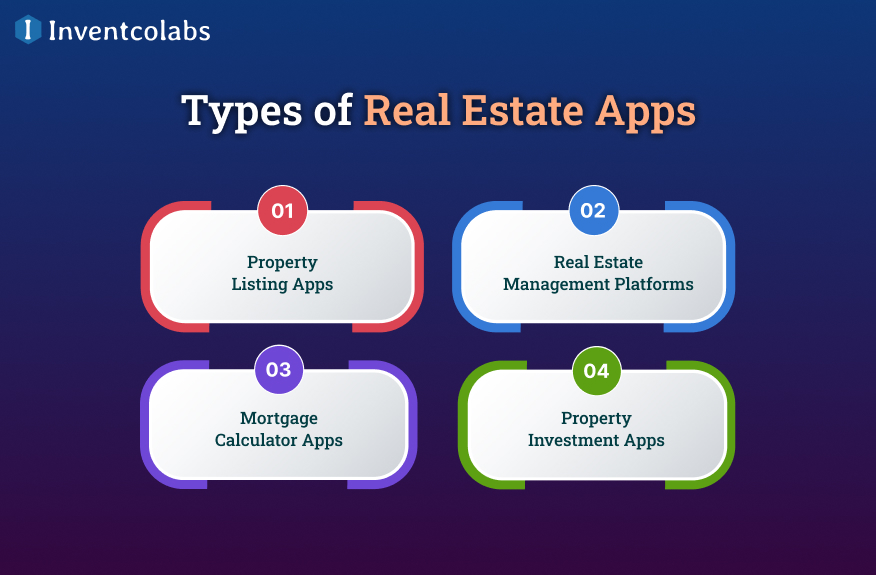
>Property Listing Apps
Designed for brokers and real estate agents, Property listing apps function as digital platforms for showcasing available properties. The apps allow professionals to build detailed listings that include specifications for the property, high-quality photos, and other pertinent information. Users can easily browse various properties, simplifying the renting or buying process.
>Real Estate Management Platforms
Ideal for property developers and management companies, Real estate management platforms are focused on improving day-to-day activities. They often incorporate features like portfolio management, tools for communication with tenants, and financial monitoring. The objective is to increase efficiency in property management, from rent collection to maintenance demands.
>Mortgage Calculator Apps
Attaining real estate professionals and prospective buyers, these mortgage calculators simplify the complicated job of financial planning. Users can input information about the property, including interest rates, property details, and loan terms, to calculate the estimated mortgage payment. These applications allow buyers to make educated financial decisions and aid professionals in guiding their clients in the financial aspects of real home transactions.
>Property Investment Apps
Designed for property developers, investors, and others interested in real estate investments, Property investment apps concentrate on studying market trends and identifying lucrative opportunities. They typically include tools like estimation of property values, market analysis tools, and investment calculators, which allow users to make strategic choices based on data-driven insight.
Rise of Real Estate Applications
The growth of online property booking solutions is now a major part of the industry’s development. Apps for real estate provide an efficient platform for property buyers, sellers, and agents to showcase their properties, search, connect, and make transactions easier throughout the buying process.
In the early 2000s, real estate apps were launched, but they were mostly focused on providing basic listings for properties and search capabilities. As geolocation and mapping technologies improved, they began to include interactive maps to show property information. Users could look up properties on maps and explore the surrounding area.
In 2010, AR/VR technology advances led to the development of virtual property tours into real property apps. Users could experience 360-degree virtual tours of homes without visiting them physically.
With the growing sustainability awareness, many real estate applications have begun to include eco-friendly features and properties that use less energy to attract environmentally conscious buyers. Technology advancements led to fetching 89 percent of all potential buyers of new houses.
Numerous real estate websites receive millions of monthly visitors and retainers due to the ease and convenience provided by the platform, which allows users to search on the go. They also simplify the real property by offering complete information and real-time details. For instance, the renowned application Zillow has an average of 245 million monthly users and attracts people looking for property agents, real estate agents, rental center owners, mortgage companies, and tenant builders.
According to reports from the National Association of Realtors, 97% of potential home buyers begin searching on the Internet, and 76% utilize mobile or tablet phones due to these apps’ numerous advantages and convenience features.
Explore More: Airbnb Clone App: A Complete Application Development Guide
Challenges Covered by Real Estate Applications
Our lives are already transforming into the digital age. Mobile apps allow us to perform anything from entertaining to buying and looking for homes. The development of real estate apps can assist you in meeting your customers’ expectations and simplifying the business process.
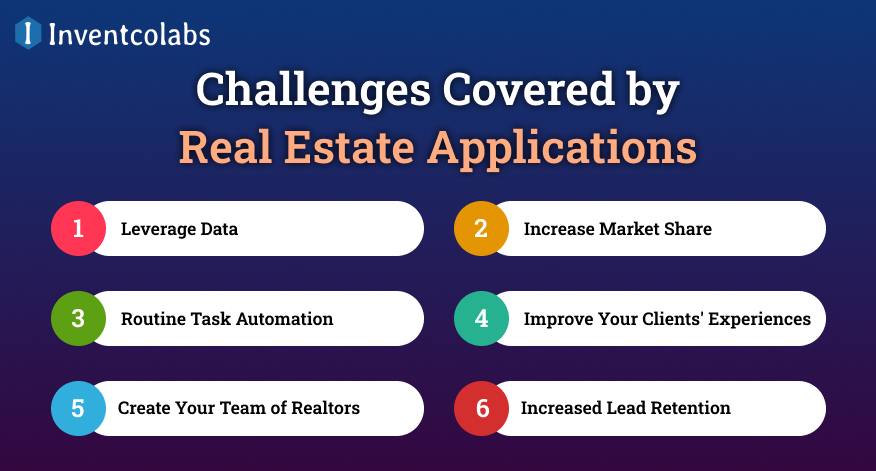
Let’s look at a few mobile apps for real estate’s advantages.
>Leverage Data
Real estate apps can be a source of data about listed properties.
The number of people searching for properties online is increasing yearly. According to Statista, most Millennials, 78 percent of Generation X, and 68 percent of the youngest Boomers utilize mobile devices to locate properties in the USA.
App development on mobile for real estate could allow prospective buyers to offer customized deals, display homes that seem more suited to their needs, help them through every step of their journey to customers, and develop more effective marketing strategies.
>Increase Market Share
In the current market, as more people search for smartphone properties, real estate mobile app development solutions are now a way to enhance market presence. Mobile applications make services available to potential buyers’ doorsteps.
A real estate company with an app can better satisfy clients’ needs and offer services on their preferred platform.
>Routine Task Automation
The primary objective of mobile real estate mobile application development is to automate mundane tasks. Agents, for instance, do not have to look up their calendars, search for free places, and reserve them for their clients.
Customers can log into the app, search for the property they are interested in, and then book a viewing immediately by choosing a convenient date and time from the agent’s responsible calendar.
Therefore, there are several reasons the development of online property booking solutions are gaining traction over the last few years. Here are some reasons to build an app for real estate:
- Better customer experience
- The ability to access all information your business produces
- Insight into customer behavior for better data-driven decisions
- The potential to increase sales and market shares, as well as reach a new audience
- Automatization of routine tasks
If you are developing mobile applications for real estate, there are several alternatives to consider. One option is to build your app using an application builder. Although this may seem cost-effective initially, you could face some issues later. App builders allow the creation of basic applications that offer limited customization.
>Improve Your Clients’ Experiences
The purchase of a home is a major decision that numerous elements can influence.
The biggest challenge for buyers is the lack of time for home visits and inspections. They must also remember every detail about every property they’ve seen, then examine it and make the best choice that fits within their desires and budget.
The agencies then receive tools that simplify clients’ decision-making processes, help them schedule viewings for properties, allow them to access data from anywhere, and allow clients to create virtual tours.
>Create Your Team of Realtors
You can also develop an application for realtors in addition to a client-facing application. The apps can include a mix of options, including scheduling viewings for properties, exchanging messages with customers and other realtors, scheduling deadlines for team members as reminders, analyzing your website’s analytics, and more.
Mobile apps for Realtors clarify processes of all kinds and help businesses organize their realtor teams and streamline their efforts in nurturing leads and converting them into customers.
>Increased Lead Retention
Real estate apps provide numerous tools to draw, convert, and keep leads.
Chat in-app and notifications, email, and other tools to keep in touch with your clients and inform them about available changes or new properties, customized special offers, and more.
Explore More: How Much Does An App Like Airbnb Cost In 2024?
Must-Have Features for Real Estate App Development
Every application, even listing apps, includes fundamental features that act as the skeleton and further features that increase users’ options and enhance the app. What features should an app for mobile real estate comprise?
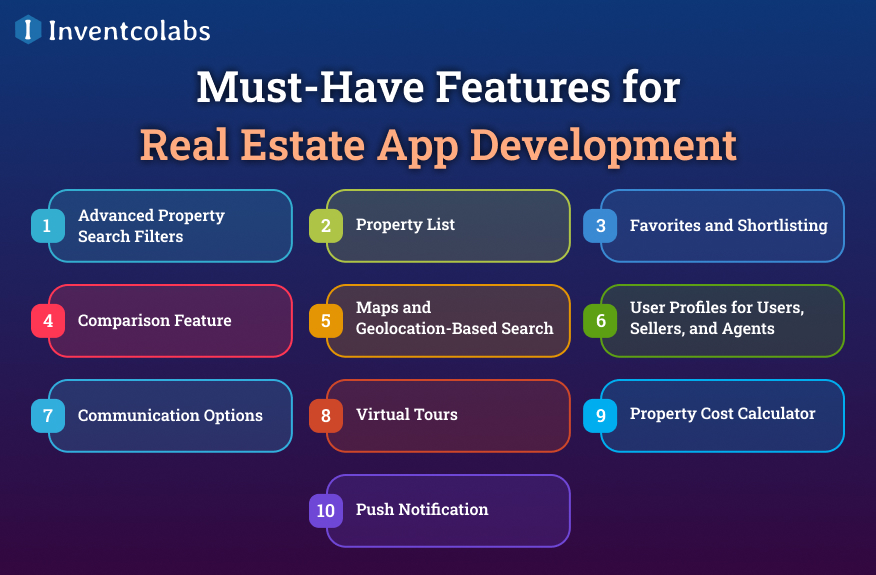
>Advanced Property Search Filters
A real estate application lets you choose the right home or location for office space depending on the size, location, and facilities. This isn’t all the features of advanced property search filters. Software lets users learn the opinions of those already living in the region. Renters and buyers may find out the crime rate in a particular area, the probability that natural events will strike, the traffic intensity, the availability of stores, infrastructure, and many more.
>Property List
The design of the property catalog must be as simple and appealing as possible. In general, the catalog consists of object cards. Each profile has images, a short text description, and various components.
>Favorites and Shortlisting
This is a chance to limit the variety of choices to a few. Users won’t need to hunt for the best alternatives, for instance, look them up and compare them.
>Comparison Feature
Comparing different options based on certain parameters greatly simplifies and speeds up the property selection.
>Maps and Geolocation-Based Search
Many buyers and sellers favor homes in specific areas. This feature lets them determine their current location and the distance to which the structure of their interest is, for example.
>User Profiles for Users, Sellers, and Agents
This feature lets you access information on any registered user. It allows them to view their rating, feedback, and also offers. It can help determine how trustworthy an individual or company is.
>Communication Options
Users might need to contact each other to discuss issues not mentioned in the description on the first page. Additionally, it’s about getting rapid support from the client support service. The more options you have, the more effective (direct messages or live chat, phone, and Social media).
>Virtual Tours
Sometimes, videos and images alone aren’t enough to introduce an area properly. Many people want to take a virtual property tour to experience the ambiance. This feature can significantly impact their final choice.
>Property Cost Calculator
Prices matter for most users. Some people find that the expense of creating an app for real estate is a major factor because they have a limited budget. Therefore, it is essential to allow users to estimate based on various parameters to plan their budget better.
>Push Notification
Push notifications are a great way to stay in contact with users and remind them about the company’s services. They help improve retention rates, as they are delivered to users even when they aren’t in the application.
Explore More: How to Develop A Rental Marketplace App – Cost and Features
Steps to Develop a Real-State Application
If you hire mobile app developers from Inventcolabs as your software building partner, you can be assured that we will create real estate software solutions with top class features.
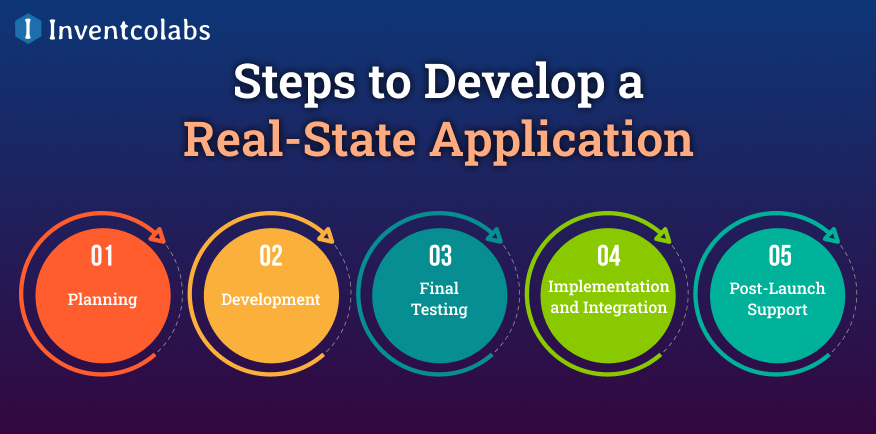
>Planning
Before we build real estate apps, we determine the intended users’ characteristics, essential goals, needs, and objectives. This lets us choose the features that the app should include. We’ll discuss them, along with the deadline and budget, with you.
Our team of experts creates the layout of every element and screen. We ensure that graphic solutions are simple. We provide a real estate app with a layout that helps you stand out.
Then, we begin MVP prototyping. In this phase, we design the project’s structure and focus on the interface and navigation.
>Development
Our developers are given the design and then refine the design estimate. Their role is to design every screen and then write code that connects them logically and permits the functionality that has been approved to operate. They also utilize codes to connect the visible component that the program runs (the front end) and the invisible portion where the data is kept.
>Final Testing
Testing is the process of eliminating technical bugs and inconsistencies within the application. If you do not do this, you will lose the initial users shortly after launch, as certain modules might not function on your device.
Like testing websites and web applications, web applications are first evaluated for layout and compatibility with the style. Then, the functional aspect of the application is evaluated.
>Implementation and Integration
When the app is complete and tested, our experts help package, manage, and deploy it. We can even help add your app to an online store. We ensure that your app meets the publishing platforms’ guidelines.
Explore More: How To Develop An Apartment Management Software – Features & Cost
>Post-Launch Support
Our team monitors your app’s performance. We’ll improve speed when necessary. Our team also rids itself of remaining bugs and suggests enhancements.
We offer full-cycle development, which is included in the real property app development costs. You don’t need to tackle each of these steps individually.
Cost of Developing a Real Estate Application
Are you wondering how much it will cost to create an app for real estate? Similar to applications, the price of developing an app for real estate will depend on its features, complexity, and the time dedicated to the development of the app. Check out the approximate amount of time spent by Real estate app development company working on the app:
- U.S.-Based developers: From $100-$250 per hour
- Developers from Eastern Europe: $80 to $180 an hour
These estimates are not exact and could differ between apps or developer to developer. A mobile app for real estate packed with features can cost around $20000 to $30000. However, if you plan to integrate the most modern technology features, like numerous integrations, the price of mobile applications for real estate development will rise and could be between $50000 and $200000.
The Key Takeaway
We’ve discussed the need to invest in app development for mobile devices to help real estate businesses and revenue models to select from, the types of apps that you can develop and the technology you can incorporate strategies to advertise your properties, the ways to create your app, a tech stack, the reasons to choose and development of real estate apps services and more.
Explore More: Property Finder App Development – Cost & Features
We hope you will find this blog useful in beginning your app development with ease and gaining an understanding of every aspect.
Since mobile applications were added to the residential real estate market that helped with renting or purchasing a new house became easier. Everyone involved in the process of searching, from brokers to agents to buyers, gains foreign applications. Since home buyers have more reason than before to use online search engines, a well-designed and professional real estate app could be an enormous success. This is the story we attempted to explain in our article about how to create a real estate-related app.




